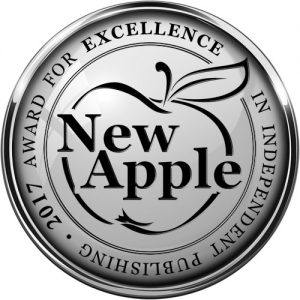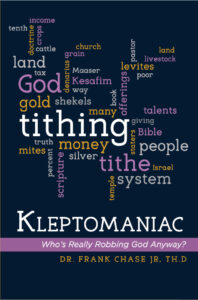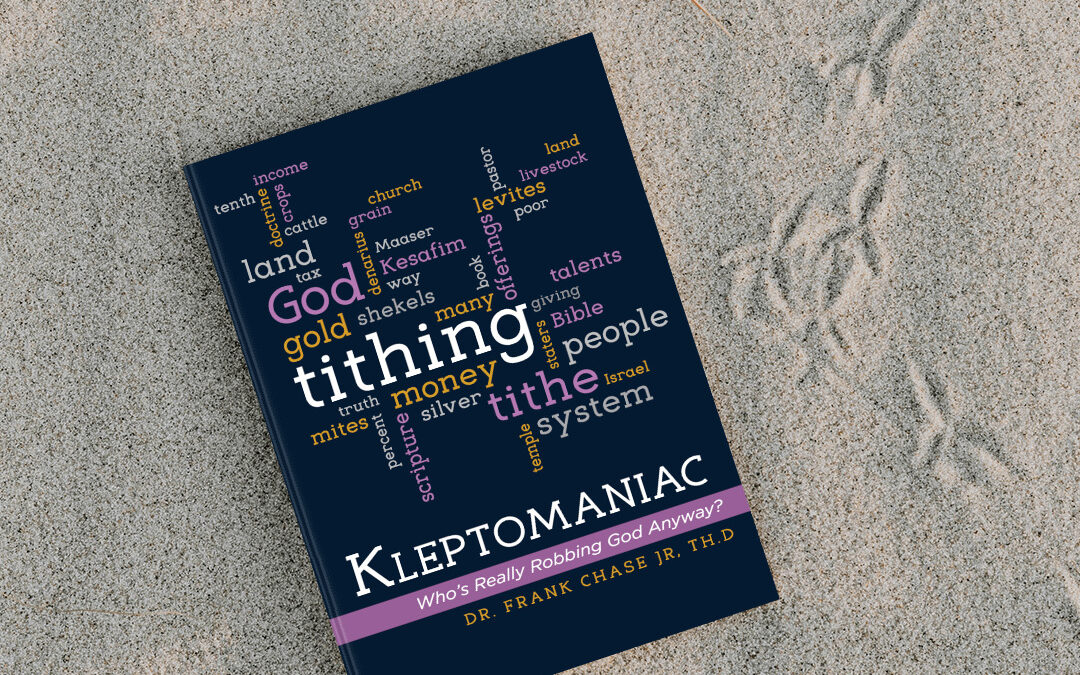Kleptomaniac: Who’s Really Robbing God Anyway Book Trailer

Scan Code to Purchase Book
Kleptomaniac: Who’s Really Robbing God Anyway got a new editorial book review in March 2023. Click on Pro Book Reviews to read the review. The biblical tithe never belonged to pastors or churches. The biblical tithe of crops and livestock belonged to the Levites, the poor, and the high priest. Kleptomaniac: Who’s Really Robbing God Anyway? tells the tale of a conspiracy to change what God wanted as a tithe.
2018 Book Review
I found Kleptomaniac: Who’s Really Been Robbing God Anyway to be incredibly informative about tithing. Coughing up ten percent of a paycheck always seemed odd to me, but this book puts the breaks on the misinterpretation of the scriptures about tithing. The research in this book covers every aspect of tithing so well, it’s hard to dispute what the author uncovers. The most shocking and simplest revelation about tithing is that the author reveals tithing is not money but food. He backs up his theology and assertions with scripture, the Hebrew and the Greek language. If you think you know what tithing is, this book will certainly upend your beliefs and make you want to research your religious beliefs on the subject. I personally enjoyed the part of the book where the author explains how he arrived at his newfound theological beliefs about tithing after engaging in the tithing rituals for more than 30 years. Kleptomaniac: Who’s Really Robbing God Anyway dives right into the tithing controversy that’s apparently existed for centuries. The book explains how the monetary tithe practices of today came into existence. The book also laid bare that the Holy Roman Empire which later became the Catholic Church ultimately became the culprits who played a pivotal role in changing the nature of tithing to what we have today. As I read through the pages of Kleptomaniac, I was amazed at how prevalent and widely practiced monetary tithing has become in the face of contravening evidence. I was equally disturbed that many Christians seemingly don’t know the origins of tithing as the author points out in the book. In the preface of the book, the author explains why he resigned from tithing and presents a sound scholarly position as to why tithing is not a New Testament doctrine. This entire book is a lesson in biblical history on tithing.
The second half of the book, even goes into what New Testament giving is all about. This book is profound in that the author provides readers with definitions for all the words associated with tithing and that makes it easier for readers not to have to look up complicated biblical terms. From the beginning to the end of the book, the author deconstructs the tithe doctrine, highlights how tithing is abused by pastors and churches and exposes what true biblical tithing is. Anyone who reads, Kleptomaniac: Who’s Really Robbing God Anyway, whether they agree or disagree with tithing, will walk away from the book encouraged and convicted to study the subject if they really care about biblical accuracy and authenticity. Getting informed about the land, language and literature of the biblical people on tithing is a must, and this book certainly does an excellent job in uncovering the truth about tithing from the scriptures. And for those who endorse monetary tithing, this book will upset their theology if they are unflinching die-hard pro-tithers. If the truth about tithing is hard to swallow, this book will cause some readers to experience cognitive dissonance in their theology. Reading Kleptomaniac and discovering that tithing was never about money in the scriptures, but about food that God requires will shake the biblical pillars of their lives. For those who read Kleptomaniac and think they have the market cornered on biblical understanding, accuracy, hermeneutics, exegesis and principles of interpretation will be in for a surprise. It will be obvious to some Christian readers that biblical authenticity and accuracy on tithing was tossed out on its head, which lulled the masses into settling for the traditions of men who reinterpret tithing scriptures as tools for amassing cash for the financial juggernaut of the institutional church
2018 Book Review By Authors Talk About It
In Kleptomaniac: Who’s Really Robbing God Anyway?, Dr. Frank Chase Jr, Th.D. explores the concept of tithing down to its very roots. Using the bible and other references, he investigates whether tithing is a mandatory tax or a gift given out of free will, as well as alternative viewpoints for those who’d rather worship with their hearts than their paychecks. Though it certainly has an interesting premise, Kleptomaniac is perhaps a bit too winding and drawn-out in many areas. Much of the first few dozen pages are comprised of redundant reiterations of what the book is about, which quickly becomes tedious and may not hold readers’ attention well. A more straightforward approach would benefit this book incredibly. Also, the narrative is a bit unbalanced; some passages read like a personal memoir about the author’s experiences, while others read like a purely factual, impersonal textbook. These aspects sometimes make it difficult to maintain interest in this book.
Nevertheless, Kleptomaniac certainly has an extremely intriguing concept. The investigation of tithing in the bible, history, and modern day is a unique and not-often-thought-of idea, which is explored quite eloquently here. Dr. Frank Chase Jr, Th.D. has incredible knowledge of the bible and a vast array of excellent sources to back up his points, which only adds to the validity of his writing. Whether readers agree with Dr. Chase’s views or not, it cannot be denied that he certainly provides something interesting to ponder in this book. Kleptomaniac: Who’s Really Robbing God Anyway? is a thoughtful, well-researched book that is equally respectful and revolutionary in its unique approach to an age-old, unspoken question—what is the purpose of tithing really?
Kleptomaniac Book Excerpt
“The modern tithe doctrine has hoodwinked many of God’s people. Tithing stands as an eisegetical idol that must be demolished so true freewill giving can reign from the heart. The rule of biblical interpretation says we cannot apply every command or statement in the Bible to ourselves. For example, in the Old Testament, God commanded that when one brother dies without a child to carry on his name, the living brother, whether married or not, was suppose to impregnate his dead brother’s wife and raise a child in his brother’s name. Are we required to follow this practice in the present day? The point is, we must consider the original audience for whom the command is written, the historical time period, the context, and the stage of God’s plan for humanity. Is a tithe payable in crops, herds, and flocks or money? To find the answer to this question, let’s peel back scriptural history across the centuries to see if the so-called cursed non-tithers were kleptomaniacs who robbed God. Also, let’s see who is really behind the conspiracy to change tithing from food to money.”
Readers’ Favorite Book Review
“Reviewed By Ray Simmons for Readers’ Favorite
Kleptomaniac: Who’s Really Robbing God Anyway? The untwisted truth about the centuries-old tithes and offering deception by Dr. Frank Chase Jr, TH. D fills a narrow but very real niche in the area of biblically derived lessons and advice on the subject of tithes and offerings. I would have thought most Christians would research this topic themselves if it were very important to them, but to have all the references in one book, along with sound commentary and advice from a biblical scholar, certainly makes it easier. Dr. Frank Chase Jr. describes his own evolution of ideas about tithing and I must say we went through many of the same phases in pretty much the same order. I stopped evolving while Frank Chase Jr. went on to write this book that helps other Christians who have the same questions he had. Christianity at its best.
Kleptomaniac: Who’s Really Robbing God Anyway? may have more biblical quotes and references to tithing and money in general than any book I have ever read, save, of course, the Bible itself. It is written in a very smooth and articulate style that I’m guessing will be understandable to most people, but at the same time Dr. Frank Chase Jr’s education and vocabulary are evident on every page. As is his faith and his desire to help. From Abraham to Paul, Frank Chase Jr. delves into the origin, the definition, the application, and even the abuse of the custom of tithing. It is an interesting and sometimes colorful history and one Christians should certainly be more aware of. This book will help them.”

Scan QR Code for Book Information
2016 Self Publishing Book Review
Kleptomaniac is an insightful and well-constructed argument on tithing and offerings at church, not only defending the author’s decision not to give money blindly, but also defending his right to seek the truth in Bible Scripture.
Everything that the author Frank Chase Jr. says is backed up in some way with huge amounts of research, resulting in a comprehensive and rather airtight argument against this unfair system that is often foisted on believers.
The balanced approach of the book is particularly enjoyable; there are no judgments or inflammatory language, but there is simply impassioned debate from a man who cares enough about his religion to perform his due diligence.
There are a few points that seem to veer off into unsupported opinions, but these are few and far between. Furthermore, there are a number of spots where word choice is a bit odd (e.g., “I asphyxiated on verses about tithing”, rather than fixated) and some grammatical editing is needed here before this is published. However, despite the delicate subject matter, the author approaches the topic with well-researched evidence, solid facts, and his own firm beliefs, to deliver a very insightful read recommended for those interested in or needing information on Church culture and community.
2019 Press Release and Book Award and Review
2019 Press Release and Book Review and Award
Kleptomaniac: Who’s Really Robbing God Anyway Book Awards








Get More information About Kleptomaniac: Who’s Really Robbing God Anyway?
When God says, bring all the tithes into the storehouse, it should be understood that He is talking about crops, herds and flocks. If the priests brought the whole tithe into the storehouse as God requested, there would have been enough food in his house. The food was for the Levites who were on temple duty. The key part of Malachi 3:10 is where it truly becomes interesting; according to the common spiritualized interpretation of Malachi, if you test God by paying 10 percent of your income, God will open up the windows of heaven and shower you with financial blessings. Malachi 3:10 says:
Bring all the tithes into the storehouse, that there may be food in My house, And try Me now in this,” Says the LORD of hosts, If I will not open for you the windows of heaven And pour out for you such blessing that there will not be room enough to receive it (NKJV).
Like a meticulous surgeon, you must find out what God meant in Malachi through word study. But before going further, I want to first head off a pro-tithe argument at the biblical pass. While tithe-collecting churches argue that tithing in Israel was upon produce and animals; today’s believers must tithe from a paycheck because all human productivity owes its origins to the earth directly and indirectly because God owns the whole earth. On the surface that seems true, but when you connect money to the earth, the tithe in Hebrew remains eatable items (produce and livestock), which makes the argument for money tithing baseless because it ignores the original Hebrew definition of the word.
Let’s examine what Malachi meant when he referred to the storehouse.



Recent Comments